#the knowledge that undertale would never work in any medium other than a video game and toby knows this......it fills me with RELIEF
Explore tagged Tumblr posts
Text
every time i see another mediocre video game movie that relies solely on the game's massive fanbase rather than actually being a good movie i rest easy knowing there is no reality that exists in which toby fox would ever pull that shit
#trousled rambles#undertale#the knowledge that undertale would never work in any medium other than a video game and toby knows this......it fills me with RELIEF#something being '''''For The Fans''''' will never excuse a movie being boring as hell sorry#the critics are probably being mean to your movie because its not a movie its a 2 hour long advertisement#(<- will never apply to sonic btw. those movies are perfect and are at least trying something NEWWWW)
20 notes
·
View notes
Text
Arcadian Rhythms
I’ve been working on this project for over a year now (since December 2017) and I am FINALLY ready to start rolling out weekly updates for Season 1! Arcadian Rhythms will be a long-form fan-fiction project similar in scale to what I’ve done in the past with projects like Life is Strange: All Wounds and What I Learned at SRU. Unlike previous fic projects, however, I won’t be posting chapters as soon as I write them. Instead, I will write a “season” of chapters, edit them, make revisions, and tighten them up more than I usually do with fanfic. Then, I will post every “episode” of a “season” once a week on a regular schedule. That way, folks will know, reliably, when to expect more, and they will be able to follow things week to week, or binge it in a big chunk, like a TV series. I’m aiming for each “season” to be about 10-15 “episodes” long, probably looking at three or four “seasons” in total, depending on how much I get involved.
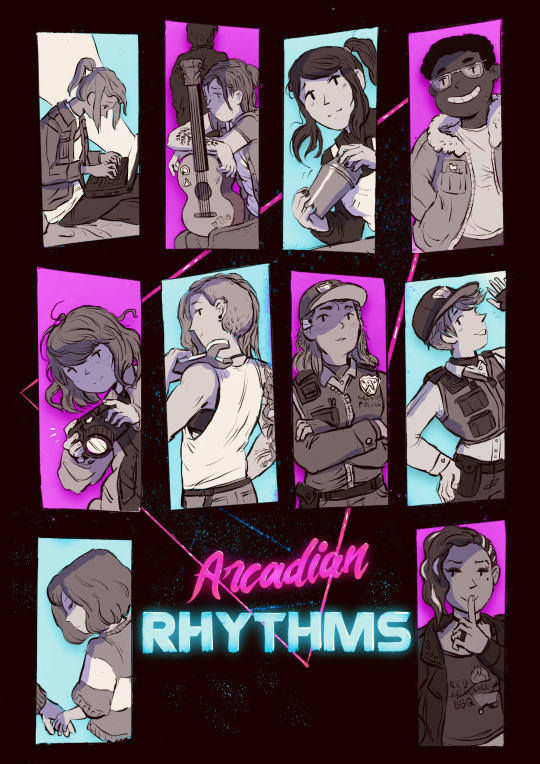
[+ Poster by @mollifiable +] (she’ll be helping me with character designs and story revisions)
It’s not long now. _̴____ w̨i͠ll ̛let ͝u͜s͝ go. ̛_____̸ ͠wil̸l̷ g̷ive͝ ̛u̵s̨ ̶hope҉. ͢_̷_̸___͢ ͟w̵ill şave u͝s ̶a̛ll. You should be smiling, too. Aren’t you excited? Aren’t you happy? You’re going to be free.
So, then, that will be the format. What is the story about, though? That’s…actually kind of hard to quantify, as it’s unlike anything I’ve written before. It will most closely resemble my old project What I Learned at SRU, but where that was a modern college AU featuring characters from Avatar: The Last Airbender (and eventually its sequel, Legend of Korra), Arcadian Rhythms will be a modern supernatural crime drama featuring AU adaptations of characters from multiple modern video games. Some of the more prominent games’ cast/ideas to be featured early on will be Undertale, Overwatch, Oxenfree, Life is Strange, Night in the Woods, The Last of Us, VA-11 HALL-A, and Horizon: Zero Dawn, to name a few, but many characters and ideas across multiple fandoms will be adapted to blend together into this single fictional world. To be clear, this isn’t a situation of crossing-over from their respective stories – this is a complete alternate universe. Rather than just re-telling a narrative you may already know, I’ll be incorporating pieces of that narrative and remixing them with pieces of other narratives, forming connections and plot points that tie together in ways that just don’t exist. As I’ve written over 100k words at this point, I feel I could kind of compare to the Netflix Marvel shows -- multiple stories, crossing over into one another, set within a single city, featuring adaptations of pre-existing characters. Yet you could enter the narrative without any knowledge of the original source materials.
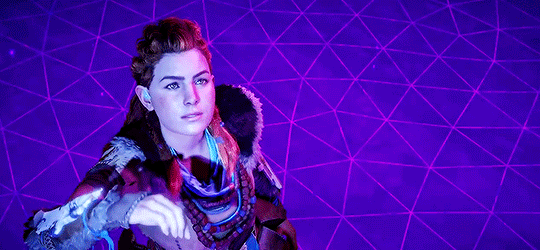
So the plot will be an original story centered around strange, supernatural events happening in a single city, weaving together and remixing different concepts and supernatural elements across many different inspirations, tying them together into one, cohesive narrative. It won’t be “well here’s the Life is Strange characters’ story, here’s the Night in the Woods characters’ story” but rather all of the characters’ stories will be interwoven together, mixing in references and elements of where you might know them from, but going in a different direction than they originally do. Most characters will be around 30 years old, with some in their early 20′s – they’ll have day jobs, they’ll have romances that couldn’t exist within their own stories (Aloy Nora and Lena ‘Tracer’ Oxton being one of the core romances, for example), they’ll be friends or rivals with one another, but they’ll all be connected by the same phenomenon going on, much like the characters in Stranger Things (only this will be more of an interwoven plot rather than separate plots conjoining). What if you haven’t played some of or any of these games? No worries – this will be an original plot. Like some of my previous work, it’s more that if you are familiar with the source material, you may pick up extra references or foreshadowing. Like What I Learned at SRU, I’ll be writing this in such a way that even someone who hasn’t played any of these games will be able to enjoy the story. But if you happen to know about some of the gritty details? That might flavor your experience differently.

In terms of tone and inspiration, I’d say the stories that have inspired this project most are The Wolf Among Us, Stranger Things, and Mr. Robot, as well as a pinch of Black Mirror. The plot will revolve around a cast of characters all interconnected by supernatural goings-on in a city inspired by 80′s retro-wave aesthetics, though it will feature modern day technology (and a bit of sci-fi-fantasy stuff).
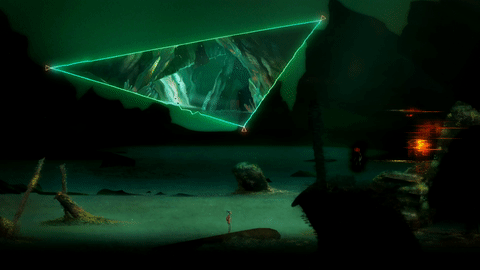
As an example (skip this paragraph if you just don’t want to know anything about the plot), . . . Think of characters like Max Caulfield, Tracer, and Frisk, (and others) who all possess the ability of short-term time travel – in this world, that is still the case, but their abilities are all connected by the same phenomenon here. Think about what kind of situation the cast of games such as Undertale and Pyre are stuck in and trying to overcome. Think of the interesting things with ‘consciousness’ or ‘the Soul’ that happen in Transistor, Undertale, or Oxenfree. . . . Basically, I’ll be mixing together different supernatural elements I like from games I’ve fallen in love with, games I’ve had plot bunnies for with fanfic, but ultimately just never wrote anything about. For example, I adore many of the characters in the games featured above, but their stories felt…complete. I didn’t feel I had anything to add to them, really, nothing felt “missing.” But when recontextualized, I can express new things. If you’ve read All Wounds you saw some of this intertextual storytelling bleeding through the latter portions in particular, and I really liked this and have a strong passion for that kind of storytelling, and figured this could be a great outlet for that, where I can take my time and just have fun with it.

While I did plan on All Wounds being my last fic, my life hasn’t really changed since I made that decision like I had hoped it would, and I really just need to keep writing things I can just have fun with. I am still working on the visual novel for All Wounds and do plan to finish it eventually. But this has definitely become my new passion project.
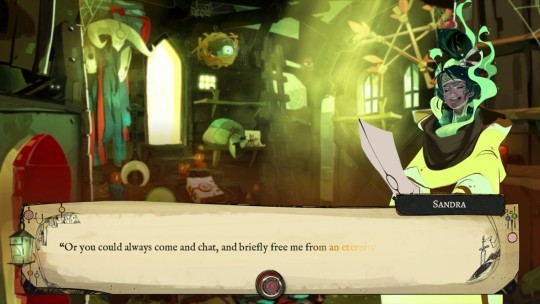
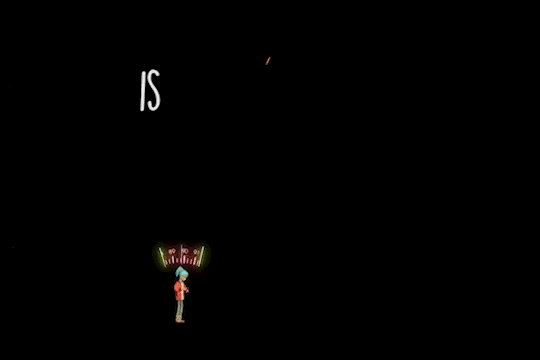
So! In the meantime! Season 1 is, at last, underway! Expect updates every Friday! You can follow this blog for updates, including artwork and music-sharing, as well as possibly more “GIF-teaser-trailers” (as my gf put it). The blog also has a lengthy playlist of tracks inspiring the story which I will add to over time. I recommend this track as a starting point to set the tone. I’ve also been curating a playlist for inspiration on YouTube. Thanks again for the support folks have given me over my strange fanfiction projects. I have a weird feeling in the pit of my stomach that this could be a fitting culmination of everything I’ve learned over the past 15 years of writing fic – if I can pull it off – while simultaneously being an expression of my passion for my favorite medium and the steps it has taken in recent years under the direction of passionate developers.
109 notes
·
View notes
Text
Video Games and Society- Rian Bannick
In the book, To Kill a Mockingbird, by Harper Lee, we see the journey of a young child learning about the real world, escaping their childhood premonitions and seeing the injustices of race and how certain groups are put down in society just because of that group treatment in the past. The game industry started off with basic arcade games that required payment for each game played, and largely targeted children and adolescents, as they're young minds would hopefully not realize that these games were meant to be impossibly difficult as to extract the most profit. So the seeds had been planted for this new type of media; a trap for children to lose their allowances accomplishing nothing and most likely begging their parents for more quarters so they can finally put that feeling of “I was so close that time!” to rest. This frightening many parents into a scare that their children were being made into addictive adults with no sense of willpower. However, this was just the beginning. With the massive success of arcade games, larger industries and experimental methods started to pop up. The first home consoles were appearing in the stores with their games, and their pixel graphics and iconic soundtracks. Games like Super Mario Bros in 1985 introduced many players to the idea of local multiplayer. A space where teamwork would be the only ideal way forward, teaching the new generation of players how to work together with your peers effectively. This is something that our American Schooling system has always stressed to students, as it's implications in the adult world are paramount. However, as early game companies like Electronic Arts and Nintendo began to move into the digital era, their staff began to include people who grew up with Super Mario and M.U.L.E., and the industry itself had shifted from strictly a children's pastime, to a new form of media for all to enjoy, similar to film, music, and literature.
The problem we see today is the same fear from the industry’s beginnings as roguelike adventures and endless games of increasingly difficult levels, where people fear Rockstar’s Grand Theft Auto V turns harmless teens into chaotic criminals. For many, these are sensationalized ads meant to grab the attention of gullible parents, because news companies need profits to stay afloat. Also, only a small number of studies have actually been done on the topic, and their results haven’t concluded that games cause reduced empathy or violent behavior. In fact, a study done at Brock University dove into this back in 2012, finding that the games subject played correlated with their behavior, but that this behavior existed before the gaming ever took place. In other words, people with violent tendencies may be attracted to darker, more violent video games, but just because a normal person plays a violent game, they won't be indoctrinated into being more violent, or committing acts of crime.
Other arguments have been made about games harming eyesight, desensitizing players to horrific acts, and being dangerously addicting. However, Sara Winters, an adult living Ocular Albinism, experienced an increase in her eyesight of 200% over two years, going from 200/20 vision, to 100/20 vision after being exposed to the games Breakout and Pokémon Red for her Game Boy during her youth. As an adult, she helps educate visually impaired children, using similar games that encourage reading and coordination to help her students get better in a way that comes naturally; having fun. Also, some groups make the statement that games desensitize players to the terrible things that occur on-screen. Such as horror games and violent action shooters depicting gore and grisly crimes. Though, this is the same case with violent movies, horror books, and even the news, which constantly depicts crimes and tragedies to increase ratings, so why should games take the blame, and be forced to censor themselves, when horrific imagery in H.P. Lovecraft has gone uncensored for years. Additionally, people have said that games are addicting, using Skinner-Box mechanics to reel in players to a never-ending loop of play that takes over their lives, getting them kicked out of college, ruining relationships, and tormenting the player an activity they don't really enjoy, but can't stop sinking their life into. Many people can admit to this, even very popular YouTubers like James Portnow of Extra Credits and Austin Hourigan from ShoddyCast, but they tell a different story. The games didn't cause the problem, there was already a problem, that games were just an outlet for. As Austin put it: “...it’s not just the games themselves causing the compulsion, but rather they're just a symptom of something lacking in someone's life. Either autonomy, a sense of purpose, or, maybe, like in my case, a state of mental illness.” Thus, it's not that games are somehow evil, or addictive, or worse than any other form of media. Sure there are bad developers and shovelware, but this true with all expressive mediums, and games shouldn't be treated any differently just because their troubled beginnings.
Games can also be a force for good, not just a source of entertainment. Undertale by Toby Fox is an outstanding example. Where most developers would make a colorful, eighty-hour RPG in an underground, fantasy setting, with the common features we've come to expect; grinding in a zone to level up, beating all the bosses, and defeating some grand villain, Undertale told a very different story. In Undertale, by all means, you could still do all those things, but the game questioned the morals of that fact in a way that most triple A game industries haven't done for their entire existence. You could go the way of most games, slaughtering everything in your path until the fateful end, when you've reached the highest level, with the best gear, when it's time to fight to final boss, and you realize, you're the bad guy. In order to avoid this however, you have to painstakingly persevere through frustration and show mercy to the opponents and monsters that mean you harm, showing that, doing the right thing isn't always easy. Other games like Battlefield 1 show a great deal of respect towards veterans, giving players a singleplayer campaign that isn't solely supposed to be entertaining, but also, especially in cutscenes and the opening minutes of gameplay, show the futility of war, and the struggles real soldiers face, so that, just for a brief moment, you come close to perhaps understanding the dread of being in the trenches waiting to die, or coming home to world that just wants to weep for you, and pity you as you are haunted by the scars of your past. Games also can instill empathy in players, as games tackle darker elements of the human experience that other media simply can not. This War of Mine does this by showcasing some awful choices during your gameplay. For example, while out scavenging for supplies you desperately need, you hear a young woman who is about to be raped. You could rush in there to save her, but the criminal is well armed, and you don't have a weapon. You'd be putting you and the people who are counting on you to bring back water and medicine in danger by doing this, but you might save this woman. Or you could ensure that the family you've made makes it another day in this harsh world, but you'll have to live with the knowledge that you left this poor woman without even trying to save her. This gives players a new understanding of the tragically difficult choices people in underdeveloped and war-torn nations have to face on a daily basis. Giving players a new appreciation for their own lives, and empathy for others that have to make these impossible choices. It just wouldn't be the same watching that choice unfold in a theatre, or reading it in a book as it would be to actually be forced to make it yourself.
Games are still young; they only really began to catch speed forty years ago, and only in the last fifteen or so have they really began establishing themselves as a true form of media in which people of all walks of life can play and be affected by. Just because games have a history of exploiting children out of their parents money so they can make a profit doesn't mean that the new companies and developers on the scene shouldn’t be able make something amazing and atmospheric for all people to immersed into. Books depict a new world for us to reconstruct in our minds, films show us that world in ways we couldn't conceive, and games give us the chance to interact with that world in a very real way. It is foolish to say that video game companies shouldn't be allowed to continue making games that tackle serious topics solely on the basis that some desperate news stations said they're dangerous, or because of their somewhat questionable history, especially when they can teach us ideas and emotions we've never known.
Despite all of this, however, games are still being censored on the claim that they’re too mature for young audiences, but games aren’t just childspay anymore. When games are mature and dark, telling a sophisticated, tragic, or hopeful tales of normal people who, by the player’s own willpower and inner strength to keep going despite the difficulty of this particular boss, or whatever the game tends to feature, sure young people will try it, simply because that’s what kids do, they break the rules, play games with M ratings, and watch R rated movies; it isn’t Spec Ops: The Line’s Fault that your child that your child wasn’t ready to experience the gritty, self-loathing terror that came with playing it. Games can show us what it means to literally “climb into [someone else’s] skin and walk around in it" (Lee 87), and feel what our movie and book protagonists feel. We make their tough choices, overcome their insurmountable challenges, and understand that, in the seemingly hopeless last moments of their world, that just maybe we can save everyone we’ve come to love by giving ourselves up, with no care of our own survival, only the saving of this world. Games can allow us to stand with our heroes, be them, feel the fear of death, the curiosity of the unexplored, the blood-pumping stress of a ticking clock, the joy of camaraderie, the pain of loss, and the tragedy of sacrifice and that is truly a beautiful thing.
0 notes